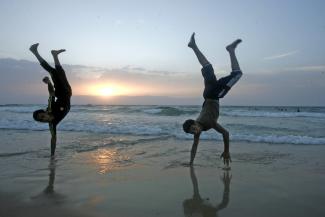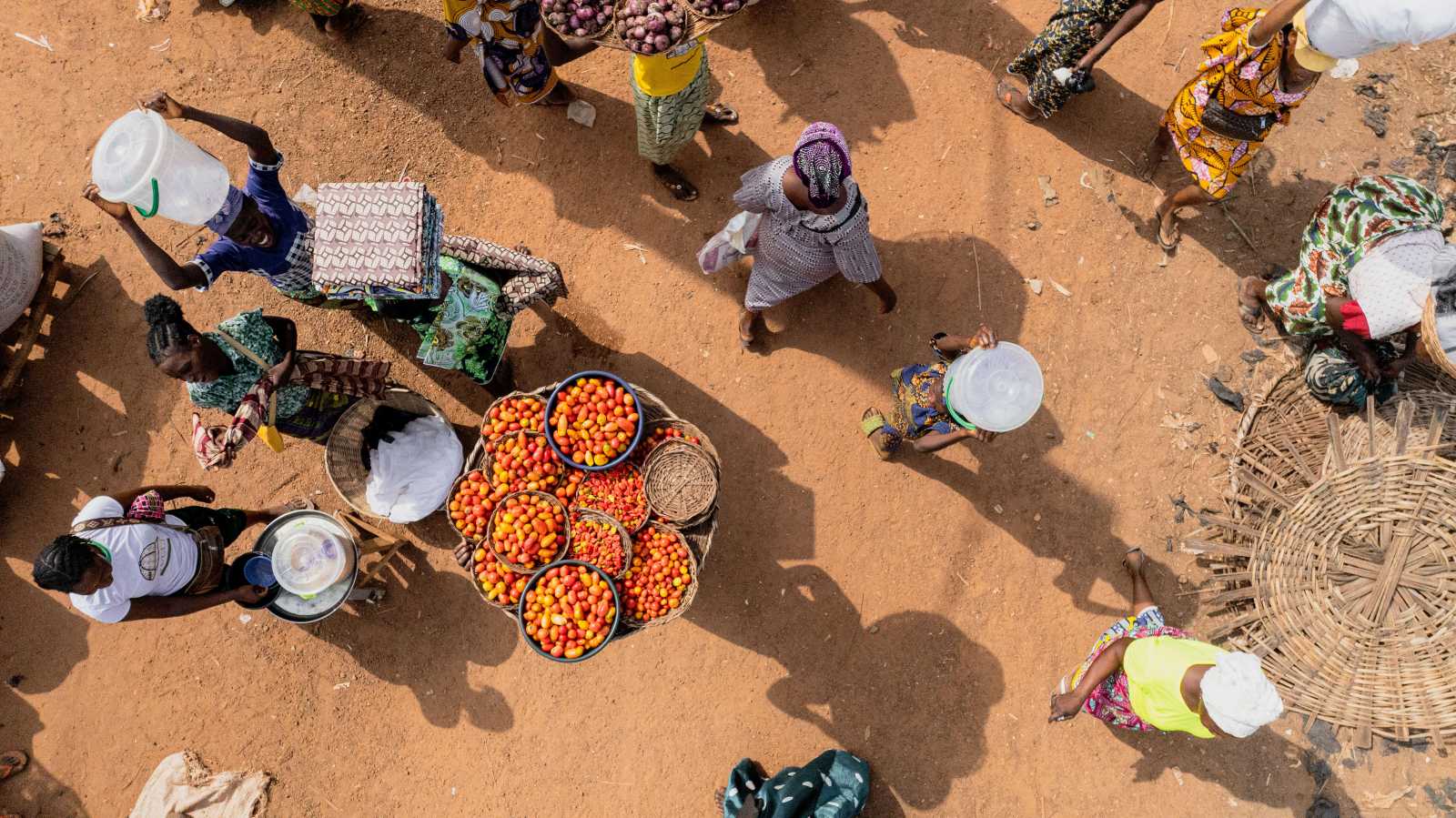Participation
Becoming agents of change

In the Palestinian Territories, the share of children and youth under the age of 18 years is at remarkable 60 %. In contrast, only 16.5 % of the German population is under 18. Young people have the potential to mobilise their communities and generate innovative and creative thinking. Empowered as active participants in civil society, they become a quite powerful force for sustainable development. No doubt, active engagement of young people in society and decision-making are indicators for effective public participation and good governance.
This could – and should – be the case in the Palestinian Territories. Unfortunately, latest surveys among Palestinian youth show alarming trends.
Although youth participation in public affairs is a right anchored in the International Convention on Civil and Political Rights (ICCPR, Articles 19 and 25), the majority of young people in the Palestinian Territories (73 %) does not belong to any political organisation. In a recent survey, “disappointment and loss of confidence” were given as reasons. Of the respondents, 42 % said that no existing political party truly represents the Palestinian people. At the same time, youth membership in various community organisations is going down. Social clubs, civil institutions or trade unions have less than 20 % of youth membership.
Nonetheless, half of the Palestinian youth say that they are able to initiate change in their society. How can this desire be transformed into active participation with relevance in the daily life of young people?
Beyond the Arab spring
The uprisings of the Arab spring in Tunisia and Egypt have set an example of impressive youth activism alongside low levels of youth participation in political parties. In Gaza, people rallied for the reconciliation of Hamas and Fatah on 15th March 2011. They triggered repression from the local security forces but, despite this, Hamas and Fatah remain ambiguous and still have not lived up to their commitment to unity government.
The daily life of young people evolves in a context of conflict. It is marked by Israeli occupation, the fragmentation of Palestinian society and tense Palestinian politics. Lacking possibilities to make a difference, Palestinian youth has become less and less active in politics, public affairs and civil society in general. Poverty, unemployment and limited freedom of movement are hardly conducive conditions for public participation. Research shows, moreover, that frequent detentions of young people have an intimidating impact.
According to the Palestinian Central Bureau of Statistics, nearly one quarter of Palestinian youth is classified as poor, and more than one third are unemployed. Statistics show that the unemployment rate for young people is several times higher than that for older members of the labour force. Among the youngest, it rises to 50 %. Youngsters who are looking for jobs are confronted with corruption and political favouritism. In order to find a job in the public or private sector, one needs “wasta”. This Arabic term stands for personal connections and influence. Personal success depends on personal relations and favouritism, but not on merit or education.
Meaningful youth participation
There is a general misconception that political participation begins and ends with elections. Young people have hardly any awareness of local governance. Most do not understand the role and responsibilities of local authorities. According to research conducted by Sharek Youth Forum, the majority (56 %) perceives municipalities merely as providers of water, electricity and infrastructure services, but not as entities for social and economic decision-making and development.
In principle, young people have a right to participate fully in society. Doing so, however, is a major challenge for young people in a culture that is as adult-centred and traditional as the Palestinian one. Youngsters are supposed to listen to and obey their elders. Only rarely are they allowed to speak up and voice their opinions.
Patriarchal structures, tribal influence on electoral lists, the lack of influence and wealth mean that young people are marginalised. For example, 57 % of the municipal councils do not have any young members in strategic decision-making positions. The Sharek Youth Forum found out that 44 % of young people would appreciate having someone who is 35 years or younger heading their municipal council.
Gender is a particularly important dimension of youth issues, as society defines different conditions for Palestinian girls than their male peers. The main role of women is considered to be parenting and performing household tasks, while the men are breadwinners and decision-makers. Those roles are reflected in the behaviour and activities of both male and female youth, thus determining what is appropriate for each gender. These social norms affect young girls’ education as well as their employment opportunities and pass-times. Girls who are forced to marry early lose out. They get neither education nor a job, and have even less say in public affairs than male members of their age group.
Various youth centres and youth clubs are run by local NGOs. To a large extent, they depend on international donors and funding. If they do not get money for specific programmes, most of them become inactive. In addition they create running costs for the respective municipalities and require maintenance.
The most independent structure for young people are sports clubs. But more often than not, they only offer football for boys and young men. There are no separate locker rooms or even training facilities for girls and young women. The male bias is evident once more.
Dependency on international funds is evident in all sectors of the Palestinian society. The Palestinian authority relies on money from donors to provide its services, but it cannot live up to all of the obligations a government faces. To some extent, non-governmental organisations are stepping in providing some essential services. Some of them pay volunteers some money, because it is hard to get people to work for free.
Conclusion
All summed up, young people don’t bother to become actively involved in society. In their eyes, engagement simply does not make sense or may even lead to detention and harassment
The authorities’ ideas about how to rise to these challenges are vague. The National Development Plan (2011–2013) envisages a greater role for women and young people in decision-making. A policy paper on Public Participation in Local Government Units’ Affairs even perceives youth as local community representatives. But so far, merely nine percent of young people have ever taken part in planning meetings for the local community.
Even considering the limited financial capacities of municipalities and villages, the key to success is establishing partnerships between the generations. Young people have to become agents for their own lives and not stay mere observers of public affairs. Institutionalising sustainable structures at the local level can give youth the space to express their needs and develop strategies to improve their lives (see box).
Alice Priori is development advisor and responsible for the Youth Create Change interventions which are implemented by the LGP (Local Governance and Civil Society Development Programme), which is run by GIZ in Palestine on behalf of Germany’s Federal Development Ministry (BMZ).
alice.priori@giz.de
Ulrich Nitschke is the programme director of the LGP. On these pages, the authors are expressing their personal opinions rather than spelling out official German policy.
ulrich.nitschke@giz.de











